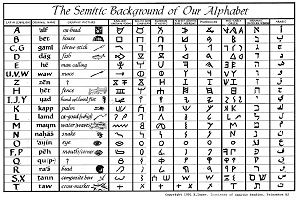Welcome
 |
Diver of linguistic jewels to be found at the bosom of history, tells us of the ancestral bond between ancient semitic tongues and grinds away at texts, phrases and words to offer a fascinating vision of the relationship between language and civilizations.
BONUS: download the chart "The Semitic Background of Our Alphabet"
Professor Hayim Tawil has spent nearly 45 years teaching assorted Jewish subjects such as Bible, philology, Hebrew and other Semitic languages to young Yewish men and women.
Educated at The Hebrew University, Dropsie College and The Jewish Theological Seminary, Dr. Tawil was a presidential fellow for 3 years and ultimately received his Ph.D. in Middle Eastern Languages and Cultures from Columbia University in 1972, specializing in Assyriology and Northwest Semitic Languages.
Educated at The Hebrew University, Dropsie College, and The Jewish Theological Seminary, Dr. Tawil was a presidential fellow for three years and ultimately received his Ph.D. in Middle Eastern Languages and Cultures from Columbia University in 1972, specializing in Assyriology and Northwest Semitic Languages. He began his teaching career in 1966 at The Jewish Theological Seminary (JTS), where he spent eighteen years on staff, twelve as an Assistant Professor of Bible. In 1988, Dr. Tawil joined the Yeshiva University faculty as an Associate Professor of Hebrew Language and Literature, and he has been on staff at YU for twenty-two years since. Tawil also spent considerable time as a guest professor of Classical Languages and Hebrew at City University of New York and Baruch College. Over the course of his YU tenure, he has twice received the Yeshiva College Professor of the Year award (2003 and 2005), a testament to his dedication to education, and especially to his students.
Aside from being a highly popular professor at YU, Professor Tawil is also a world-renowned academic researcher and expert in the fields of philology (the study of linguistics and literary texts), lexicography, (the study and analysis of semantic relationships in language and the act of compiling, writing and editing dictionaries), and Ancient Semitic Languages. Perhaps Dr. Tawil's most prized academic accomplishment thus far is his recently published An Akkadian Lexical Companion for Biblical Hebrew: Etymological-Semantic and Idiomatic Equivalents With Supplements on Biblical Aramaic (2009). Dr. Moshe Bar Asher, Professor Emeritus of The Hebrew University, President of the Academy of the Hebrew Language, and Winner of the Israel Prize in 1993, said of Tawil: "The work of Professor Hayim Tawil contributes to the study of the Hebrew Bible and its language at its highest level. His expertise in the Bible, its language, and in the world of the Ancient Near East is apparent from this important study. Many idioms and expressions from the Book of Books find their elucidation in Professor Tawil's explications." Dr. William W. Hallo, The William M. Laffan Professor Emeritus of Assyriology and Babylonian Literature at Yale University believes that "the result [of Tawil's lexicon] is an impressive demonstration of the extent to which the languages in question illuminate each other." Dr. Peter Machinist, The Hancock Professor of Hebrew and Other Oriental Languages at Harvard University, also praised An Akkadian Lexical Companion for Biblical Hebrew, writing "Tawil's lexicon should become an essential reference for all future scholarship in this challenging field." As well, Dr. Richard White, Professor of Semitic Languages and a colleague of Dr. Tawil's at YU, maintains that An Akkadian Lexical Companion for Biblical Hebrew is "the greatest contribution to biblical study published in the past 100 years."
In addition to the highly regarded lexicon, Tawil coauthored with Bernard Schneider, a scholarly work on the Aleppo Codex titled Crown of Aleppo: The Mystery of the Oldest Hebrew Bible Codex. The Crown of Aleppo was published in 2010 and, like the lexicon, has been celebrated in the academic community. Yeshiva University President Richard M. Joel said that the Crown of Aleppo is "[an] enlightening and timeless work ... combining thorough history with page-turning storytelling." Dr. Yosef Tobi, Professor of Hebrew and Comparative Literature at the University of Haifa, Israel, wrote that the Crown of Aleppo is "a marvelous study [that] ... explores in an impressive and original manner ... the Jewish community of Aleppo ... and significance of the Crown."
Dr. Tawil has also published over thirty articles on Semitic
lexicography and Biblical philology in prestigious journals such
as the Journal of Semitic Studies, Journal of Near Eastern Studies,
Zeitschrift für dia alttestamentliche Wissenschaft, Journal
of Biblical Literature, Bulletin of the American Schools of Oriental
Research, Beit Mikra and others. These articles are being compiled
by his students at Yeshiva College to be published in a separate
volume. Tawil is currently working diligently on a new book, Thematic
Interpretation of Song of Songs.
In addition to his Biblical scholarship and accomplishments, Dr.
Tawil is an advocate and international diplomat for the betterment
of worldwide Jewry. In 1988, he was appointed chairman of the
International Coalition for the Revival of the Jews of Yemen (ICROJOY).
Tawil served as the chairman of the ICROJOY for five years. In
1991, Professor Tawil ultimately secured the release of over 1200
of the last remaining Jews of Yemen; these Jews were completely
isolated from the outside world since 1962. In 1998, Professor
Tawil published Operation Esther: Opening
the Door for the Last Jews of Yemen, which chronicled
his involvement and experiences helping the stranded Jews of Yemen
in the late 1980's and early 1990's. In 2001, Dr. Tawil was nominated
for the Eleanor Roosevelt Human Rights Award for his humanitarian
work in Yemen. Former American Ambassador to Bahrain David M.
Ransom proclaimed that Professor Tawil's efforts in Yemen "displays
the best of American courage, initiative, hard work, practicality
and optimism."
Dr. Tawil was also nominated for the Menachem Begin Prize for Israel for his work in Yemen in 2005.
Read More | By Yoni Zisook - Published: Sunday, March 6, 2011


